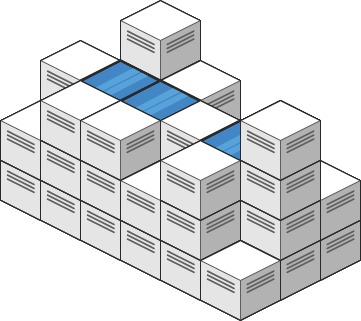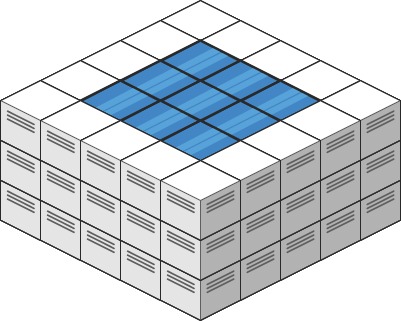407. Trapping Rain Water II
Description
Given an m x n integer matrix heightMap representing the height of each unit cell in a 2D elevation map, return the volume of water it can trap after raining.
Example 1:

Input: heightMap = [[1,4,3,1,3,2],[3,2,1,3,2,4],[2,3,3,2,3,1]] Output: 4 Explanation: After the rain, water is trapped between the blocks. We have two small ponds 1 and 3 units trapped. The total volume of water trapped is 4.
Example 2:

Input: heightMap = [[3,3,3,3,3],[3,2,2,2,3],[3,2,1,2,3],[3,2,2,2,3],[3,3,3,3,3]] Output: 10
Constraints:
m == heightMap.lengthn == heightMap[i].length1 <= m, n <= 2000 <= heightMap[i][j] <= 2 * 104
Solutions
Solution: Breadth-First Search + Priority Queue
- Time complexity: O(mnlogmn)
- Space complexity: O(mn)
JavaScript
js
/**
* @param {number[][]} heightMap
* @return {number}
*/
const trapRainWater = function (heightMap) {
const m = heightMap.length;
const n = heightMap[0].length;
const directions = [
[0, 1],
[0, -1],
[1, 0],
[-1, 0],
];
const queue = new MinPriorityQueue({ priority: ({ height }) => height });
const visited = new Set();
let maxHeight = 0;
let result = 0;
for (let row = 0; row < m; row++) {
for (let col = 0; col < n; col++) {
if (row > 0 && col > 0 && row !== m - 1 && col !== n - 1) continue;
queue.enqueue({ height: heightMap[row][col], row, col });
visited.add(`${row},${col}`);
}
}
while (queue.size()) {
const cell = queue.dequeue().element;
maxHeight = Math.max(cell.height, maxHeight);
for (const [moveRow, moveCol] of directions) {
const row = cell.row + moveRow;
const col = cell.col + moveCol;
const key = `${row},${col}`;
if (row < 0 || col < 0 || row >= m || col >= n) continue;
if (visited.has(key)) continue;
const height = heightMap[row][col];
visited.add(key);
result += Math.max(0, maxHeight - height);
queue.enqueue({ height, row, col });
}
}
return result;
};